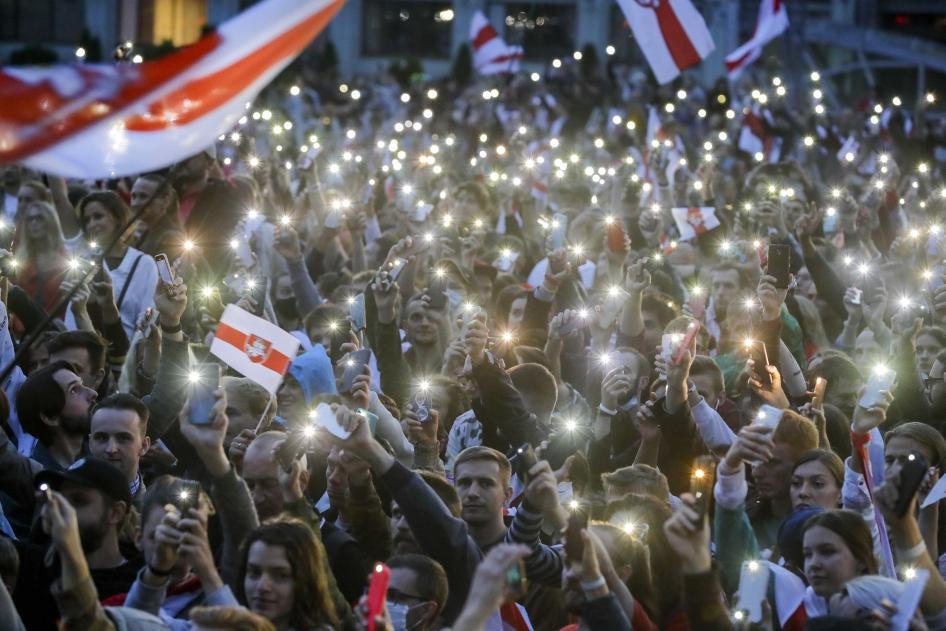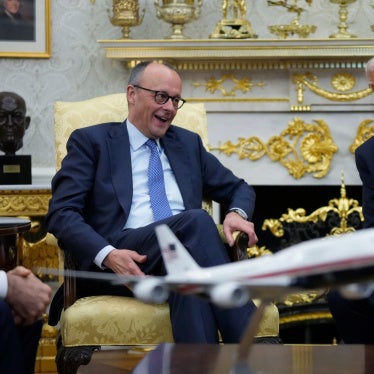For weeks, hundreds of thousands of democracy demonstrators from all walks of life have taken to the streets in cities across Belarus. Their messages and demands are straightforward: release jailed dissenters, provide justice for the serious security force abuses – including torture, enforced disappearances, and killings – and have their votes counted in truly free and fair elections.
The European Union, its member states, and others, including the United Kingdom and Canada, have all condemned the Lukashenka administration’s brutal violence and echoed protesters’ demands, including for accountability for the security force abuses.
A 30-year-old IT worker told my colleague in Minsk that riot police detained him before the protests got started on August 11. They ordered him to unlock his phone. When he refused, they hauled him into the van and beat and kicked him, and eventually raped him with a police truncheon, onto which one officer had applied a condom. In the next 30 hours police took him to two stations, where he was beaten repeatedly. A doctor at the second station finally called him an ambulance. Doctors at a hospital diagnosed hematomas to his scrotum, pereanal area, and left eye, as well as a concussion. Photos that he showed my colleague clearly showed bruises.
He is just one of dozens of survivors of police abuse whom Human Rights Watch has interviewed in Belarus. Hundreds more of the nearly 7,000 people detained have – upon their release – given accounts of systemic threats, beatings, and horrific torture by the police and security forces, showing photos of their bruised bodies as evidence of their ordeals. Those responsible for these atrocities need to be held accountable.
EU member states and other like-minded governments should be motivated and inspired by the courage, humanity and dignity of Belarus torture survivors and democracy protesters. Their demand for justice, as opposed to revenge, should be celebrated and assisted by an international effort to independently gather, analyze and preserve evidence of serious human rights violations with a view to further both truth-telling and justice. This should be an urgent priority of those who have made a commitment to accountability.
There are two avenues available for states to ensure that evidence of the abuses by Belarus authorities is collected, analyzed, and preserved by impartial and independent international experts.
One is through a United Nations Human Rights Council resolution asking the Office of the UN High Commissioner for Human Rights to take up the task.
The second is through the Organization for Security and Co-operation in Europe (OSCE), by which 10 member states can trigger the so-called ‘Moscow Mechanism’ in response to serious human rights violations. Under this system, an independent expert would investigate, present the results, and put forward evidence, analysis and recommendations to prevent abuses, ensure justice, and provide redress for victims.
Some contend that such an international inquiry would impede other OSCE efforts to facilitate a political dialogue between the Belarusian authorities and the opposition for the purpose of securing a path to free and fair elections. There is little basis for that view. Instead, facts gathered by impartial and independent international experts would assist any internationally facilitated dialogue, and would avoid a ‘he said, she said’ dynamic.
Truth matters, and securing facts and evidence of grave abuses while ‘fresh’ is always pivotal. A dedicated international effort to gather, analyze and preserve evidence of human rights crimes by the Belarusian authorities would send a strong message that those responsible will be held to account, a message that the demands of hundreds of thousands of Belarusians for justice will be supported by more than mere words.
As new arrests of protesters, strikers and journalists are taking place, the Belarus government and security apparatus officials who get this message might think twice before committing further serious abuses.
Government leaders’ expressions of support for justice for human rights crimes are welcome, but they need to be backed up by collective international action to have real impact.
For Belarus’ torture survivors, justice is not a moral luxury, but a right. The time to break the vicious cycle of impunity is now.









